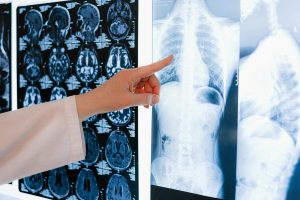Introduction
Endometriosis can be a very debilatating condition in which the tissue that typically lines the inside of the uterus, called the endometrium, grows outside of the uterus, in other areas of the body. This can cause pain, inflammation, and the formation of scar tissue, as well as potentially affecting fertility. Endometriosis can occur in various parts of the body, such as the ovaries, fallopian tubes, and the lining of the pelvis, and its symptoms can range from mild to severe. It is estimated to affect around 10% of women of reproductive age.
Symptoms of Endometriosis
- Very painful or heavy menstruation
- Pain during sex
- Bloating
- Lower back pain
- Bowel changes, especially around menstruation
- Infertility
- constipation
- nausea
- fainting
- lethargy
- chronic fatigue
It is tragic that numerous women with endometriosis do not receive a prompt diagnosis. On average, the delay in diagnosis is between 5 to 7 years. This implies that many women endure excruciating and sometimes incapacitating pain related to endometriosis for a considerable portion of a decade, believing it to be severe menstrual issues.
Causes of Endometriosis
Although endometriosis can occur in any woman who menstruates, the exact reason why it affects some women and not others remains uncertain. While some women may have a genetic predisposition, other factors can contribute to the development of endometriosis.
Immune System Imbalnce; Endometriosis is also associated with an immune system imbalance. The severity of symptoms in women with endometriosis is positively correlated with the levels of immune cells in the peritoneal fluid, indicating a potential autoimmune component.
Diet and Lifestyle; Diet and lifestyle factors can contribute to the development of endometriosis including a sedentary lifestyle, consumption of processed foods & sugar, and exposure to synthetic estrogens and hormone-disrupting substances.
Excess Oestrogen; Regrettably, due to our toxix environment that we continue to bathe in, excess estrogen is more common than not in women (and many men). This surplus of estrogen can contribute to the development of endometriosis in certain women.
Inflammation;
Similar to excess estrogen, inflammation is also influenced by our lifestyle. Our diet and exposure to toxins, as well as how efficiently our body detoxifies them, can promote inflammation and contribute to the development of endometriosis.
Inflammation; Although you cannot control your genetics, you can minimize inflammation in your body, by removing excess estrogen by your liver, and enhance your immune system by adopting a suitable nutritionapproch targeted supplementation, and healthy lifestyle choices.
The conventional medicine approach to Endometriosis
The sole conclusive method to diagnose endometriosis is through laparoscopy, a surgical procedure that involves inserting a camera into the pelvis through a small incision near the navel. The surgeon uses the camera to view the pelvic organs and search for indications of endometriosis.
The conventional medicine approach to endometriosis usually involves the use of medications, hormone therapy, and surgery. Pain relief medications such as nonsteroidal anti-inflammatory drugs (NSAIDs) are typically used to alleviate pain and discomfort associated with endometriosis. Hormonal therapy, such as birth control pills or gonadotropin-releasing hormone (GnRH) agonists, may also be prescribed to regulate the menstrual cycle and reduce the growth of endometrial tissue.
In cases where the symptoms are severe or there is significant tissue growth, surgery may be recommended. The surgical procedure may involve removal of endometrial tissue or removal of the uterus and ovaries (hysterectomy and oophorectomy). However, surgery is usually considered a last resort and is typically only recommended if other treatment options have failed.
How does Functional Medicine help endometriosis?
As mentioned endometriosis is identified by elevated inflammation and estrogen activity, as well as a potential immune system imbalance. Adopting a functional medicine strategy enables us to tackle these problems at their source by utilizing specific diet and lifestyle modifications to reduce inflammation and promote healthy estrogen metabolism. This approach can subsequently have a favorable impact on the manifestation of symptoms which can include looking at the following.
Hormone Health
Endometriosis is a condition that is closely linked to hormone health, specifically the hormone estrogen. Estrogen is the primary female sex hormone responsible for the development and regulation of the female reproductive system. In a normal menstrual cycle, estrogen levels rise and fall in a balanced way, leading to the shedding of the uterine lining during menstruation. However, in women with endometriosis, the hormone balance is disrupted, leading to an overproduction of estrogen and other hormone imbalances. This excess estrogen can contribute to the growth and spread of endometrial tissue outside of the uterus.
To address hormone imbalances and support hormone health in women with endometriosis, a functional medicine approach can be used which aims to identify and address the root causes of the condition, including dietary and lifestyle factors that may contribute to hormone imbalances. Eating a nutrient-dense, whole foods-based diet with plenty of fiber-rich foods can help support hormone health and detoxification. Additionally, targeted supplementation with nutrients such as B vitamins, magnesium, and zinc can help support healthy hormone metabolism. Regular exercise and stress reduction techniques such as meditation and yoga can also be beneficial in supporting hormone health and reducing inflammation in the body. By addressing hormone imbalances through a functional medicine approach, women with endometriosis can support their overall health and reduce symptoms associated with the condition.
Gut Health
Gut health plays a crucial role in the development and management of endometriosis. The gut is home to trillions of bacteria that play a key role in regulating the immune system, controlling inflammation, and producing hormones. Dysbiosis, or an imbalance of gut bacteria, has been linked to the development and progression of endometriosis. In addition, endometriosis itself can lead to gut dysfunction, with women experiencing symptoms such as constipation, diarrhea, and bloating.
A functional medicine approach to endometriosis focuses on restoring gut health through dietary changes, targeted supplementation and lifestyle interventions. This may include increasing fiber intake to support the growth of beneficial gut bacteria, incorporating fermented foods to provide probiotics, supplements to reduce inflammation including curcumin and omega 3 fatty acids and avoiding food triggers that may exacerbate gut symptoms. By addressing gut health, women with endometriosis can not only manage their symptoms but also potentially prevent the progression of the disease.
Foods to Reduce Inflammation
There are several foods that are known to cause inflammation in the body, which can worsen symptoms of endometriosis. Processed foods that are high in sugar and unhealthy fats, such as fast food, fried foods, and sugary snacks, are common culprits. In addition, red meat and dairy products from conventionally-raised animals can contain high levels of inflammatory substances, such as arachidonic acid and hormones. Refined carbohydrates, such as white bread and pasta, can also contribute to inflammation in the body. Finally, certain cooking oils, such as vegetable oils like soybean and corn oil, can contain high levels of omega-6 fatty acids, which can promote inflammation when consumed in excess.
Environmental exposures that might be contributing to the endometriosis
Xenoestrogens mimic the effects of natural estrogens by binding to hormone receptors in the body and disrupting estrogen signaling mechanisms. This can lead to hormonal imbalances and promote estrogen dominance, which is a significant concern for women with endometriosis.
They are found in various everyday products, including plastics, cosmetics, and pesticides, and can enter the body through ingestion, inhalation, or skin contact. Exposure to xenoestrogens has been linked to various health concerns, including hormonal imbalances, reproductive problems, and an increased risk of certain cancers. Minimizing exposure to xenoestrogens in the environment is essential for maintaining optimal health, particularly for individuals with endocrine disorders or other hormonal imbalances.
Immune Health
The immune system is responsible for identifying and removing abnormal cells, including endometrial tissue that has migrated to other parts of the body. However, in women with endometriosis, the immune system fails to recognize and remove these abnormal cells, resulting in chronic inflammation and tissue damage. A compromised immune system can further exacerbate these symptoms and lead to a more severe form of the disease. Thus, maintaining a healthy immune system through proper nutrition, stress management, and exercise is essential for managing the symptoms of endometriosis and improving overall health.
Food to support endometriosis
Foods to Support Detox
- Artichokes
- Beets
- Burdock
- Broccoli
- Cabbage
- Cauliflower
- Carrots
- Kale
- Lemon & Lime
- Dandelion & mustard greens
- Watercress
Foods to support the immune system
Best foods for supporting the immune system,
Citrus fruits: high in vitamin C which is an antioxidant that helps protect cells from damage.
Garlic: contains compounds that have been shown to boost the immune system.
Ginger: has anti-inflammatory properties that can help support immune function.
Leafy greens: rich in vitamins A, C, and E, as well as antioxidants and fiber.
Berries: high in antioxidants and vitamin C.
Mushrooms: contain beta-glucans that stimulate the immune system.
Turmeric: contains curcumin, which has anti-inflammatory properties and may boost immune function.
Yogurt: contains probiotics, which are beneficial bacteria that can help support the gut and immune system.
Nuts and seeds: rich in vitamin E and healthy fats that can help support immune function.
Oily fish: such as salmon, mackerel, and sardines, contain omega-3 fatty acids that have anti-inflammatory properties and may support immune function.
Fibre Rich Foods
Some of the best fiber-rich foods include:
- Whole grains – such as oats, barley, quinoa, and brown rice.
- Fruits – such as apples, berries, oranges, pears, and bananas.
- Vegetables – such as broccoli, cauliflower, carrots, spinach, and sweet potatoes.
- Legumes – such as lentils, chickpeas, black beans, and kidney beans.
- Nuts and seeds – such as almonds, chia seeds, flaxseeds, and pumpkin seeds.
- Avocado – a great source of fiber and healthy fats.
- Bran – such as wheat bran, oat bran, and rice bran.
- Artichokes – a vegetable that is high in fiber and antioxidants.
Sleep and Endometriosis
It can be underestimate the importance of sleep and it should be a key factor in trying to overcome the condtion. And best of all its completely free. Getting insufficient sleep, even in small amounts (less than 7-hours per night on a regular basis), can amplify stress making it more challenging to manage endometriosis symptoms.
To prioritize sleep, try to maintain a consistent bedtime and wake-up time to regulate your circadian rhythm and support hormone balance. Before bed, consider a digital detox and limit exposure to blue light from electronic devices such as mobile phones and computers. Blue light can suppress melatonin production, which induces wakefulness. Using herbal teas and supplements (magnesium glycinate) can be very helpful to get to sleep.
Conclusion
As you can see Endometrios needs a multi progned approach to help manage the condition. It really takes into account of the all the pillars of health including nutrition, sleep, exercise, supplements, environment.
In additon, you need to look at the root cause and fixing issues that can be contributing towards the conditon including hormne health, gut health, environmental exposures which will all be contribtuing factors. If you would like to work with an expert Functional Medicine Practitoner then you can book a consultation with us at the London Centre for Functional Medicine.








